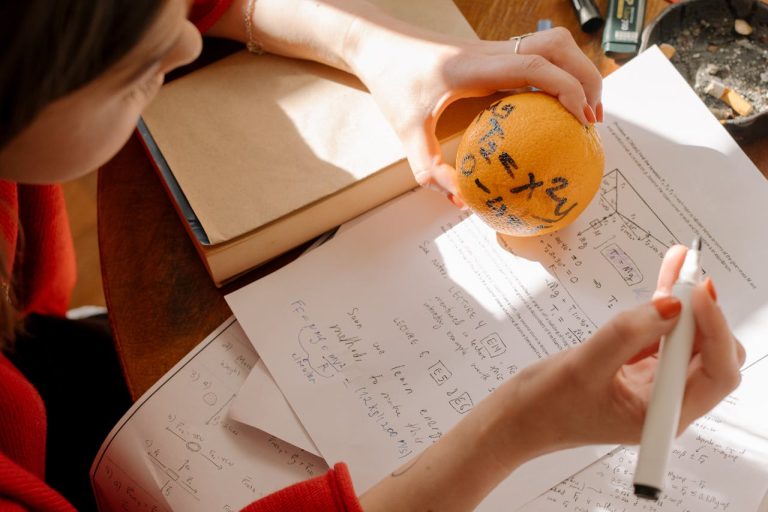As an experienced IB writer and mentor, I’ve dealt with the complex area of IB Mathematics: Analysis and Approaches (AA) course countless times. As a result, I’ve gained invaluable insight into writing a compelling IB Math AA Internal Assessment (IA). I’m eager to share my knowledge with you today, hoping it will light your path to IA success. And most importantly, I will give you some ideas for IB Math AA IA topics.
What Is the Internal Assessment for IB Math AA?
While guiding students through the IB Diploma Programme, I’ve encountered numerous queries about the nature of the IB Mathematics course. It’s perfect for students with a strong interest in mathematics, particularly those inclined toward topics requiring a solid understanding of mathematical concepts and techniques.
The Internal Assessment for IB Math AA is a significant component of the curriculum, representing an opportunity for students to research an area of mathematics that interests them personally.
Drawing from my extensive experience in guiding IB students, the IA is essentially a research project that counts for 20% of the final grade in the Math AA course. This component challenges students to apply their mathematical knowledge creatively and independently, demonstrating their ability to investigate a mathematical topic thoroughly. The IA process encourages students to:
- Choose a Topic. The research theme should interest the student, ideally connecting mathematics to real-world contexts or other disciplines, such as physics, economics, or even art. The chosen topic for IA should allow for a deep mathematical exploration.
- Research and Develop a Focus. This process involves gathering relevant information, identifying mathematical tools and techniques appropriate for the task, and considering the scope of the investigation to ensure it is manageable.
- Carry Out the Investigation. When writing Math IA, students apply their mathematical knowledge and skills to solve problems, make conjectures, and, in some cases, develop original mathematical models.
The IA is presented as a structured written report, typically 12-20 pages long, where students outline their research question, methodology, findings, and reflections on the investigation.
This report requires students to explain complex mathematical concepts and their applications clearly and coherently, making their reasoning accessible to readers unfamiliar with the topic. Also, remember that avoiding typical Internal Assessment mistakes will lead to a more thorough, well-researched project.
IB Math AA IA Topics and Research Questions
Drawing from my extensive experience with the IB curriculum, I have curated a list of IB Math AA IA topics and associated research questions tailored to SL and HL levels.

Standard Level (SL) IB Math AA IA Topics
SL covers core topics in algebra, functions and equations, calculus, statistics, and probability, and an introduction to proofs. The course develops students’ ability to construct, communicate, and justify correct mathematical arguments:
- Optimizing Personal Finance with Mathematical Models. How can compound interest and inflation models be applied to devise an optimal savings strategy for retirement?
- Statistical Analysis of Performance Metrics in Professional Football. Can a predictive model based on player statistics accurately forecast the outcome of a league season?
- The Golden Ratio in Renaissance Art. How prevalent is the Golden Ratio in the composition of Leonardo da Vinci’s paintings?
- Modeling Population Growth Using Differential Equations. Which mathematical model most accurately predicts the growth of an urban population over 20 years?
- Applying Calculus to Model Epidemic Spread in Communities. How can the SIR model be adapted to predict the spread of a new virus?
- Geometric Principles in Sustainable Building Design. How do geometric shapes influence the energy efficiency of modern buildings?
- Accuracy of Linear Regression in Local Weather Prediction. How effective are linear regression models in predicting rainfall amounts in a tropical climate?
- Mathematical Modeling of Free Throw Success in Basketball. What is the relationship between the angle of release and the success rate of free throws?
- Pattern Recognition in Classical Music Compositions. Can patterns in the structure of Beethoven’s symphonies be quantitatively analyzed through mathematical models?
- Prime Numbers and Their Role in Secure Communications. How critical are prime numbers in the construction and security of modern encryption algorithms?
- Mathematical Models Predicting Climate Change Impacts. Which model provides the most accurate predictions for Arctic ice melt over the next 50 years?
- Improving Supply Chain Efficiency with Linear Programming. How can a small retailer use linear programming to minimize shipping costs across its supply chain?
- The Application of Game Theory in Competitive Business Strategies. How can the Nash Equilibrium concept be used to analyze competitive strategies in oligopolistic markets?
- Predicting Earthquake Probabilities with Statistical Models. What statistical model most accurately estimates the frequency of significant earthquakes in a seismically active region?
- Investigating Fractal Patterns in Plant Growth and Development. How closely do fractal models represent the branching patterns of trees?
- The Mathematics of Voting Systems. How do different voting systems affect election outcomes, and what mathematical principles underlie these systems?
- Analysis of Renewable Energy Efficiency. Can mathematical models predict the efficiency of solar panels based on geographical and environmental factors?
- Mathematics Behind Credit Scoring Systems. How do banks use mathematical algorithms to determine credit scores?
- Optimal Strategies in Board Games. What mathematical strategies can be applied to increase winning chances in a game like chess or checkers?
- Mathematical Analysis of Social Network Patterns. How can graph theory explain social media’s spread of information (or misinformation)?
- Economics and the Mathematics of Market Equilibrium. How can algebraic functions model supply and demand curves to find market equilibrium?
- The Impact of Compound Interest on Student Loans. What are the long-term effects of compound interest on different types of student loans?
- Analyzing Traffic Flow with Mathematics. How can mathematical models improve traffic flow and reduce congestion in urban areas?
- The Role of Probability in Insurance. How do insurance companies use probability to calculate premiums and manage risk?
- Geometry in Fashion Design. How do designers use geometric patterns and shapes to create aesthetically pleasing and functional clothing?
These topics and questions can inspire IB students to explore the fascinating intersection of mathematics with real-world applications, pushing the boundaries of their understanding and creativity.
Buy IB IA with Full Confidentiality!
Grab your IB IA with full privacy guaranteed.
Our no-leak policy keeps your details 100% secure.

Higher Level (HL) IB Math AA IA Topics
HL students in IB Math AA engage with additional topics and explore core subjects more extensively, including a more in-depth study of calculus and a further exploration of algebra and geometry:
- Differential Equations Modeling Structural Behavior in Civil Engineering. How can differential equations predict the oscillation of skyscrapers under wind load?
- Utilizing Complex Numbers in Oscillatory Electrical Circuit Design. How do complex numbers facilitate the design of circuits for specific resonance frequencies?
- Applying Non-Euclidean Geometry to Model Space-Time Curvature. How does non-Euclidean geometry provide a framework for understanding gravitational lensing?
- Fourier Transforms in Analyzing Musical Instrument Sounds. How can Fourier analysis differentiate between the sound signatures of a violin and a flute?
- Exploring Topology Through Möbius Strips and Their Technological Applications. What unique properties of the Möbius strip make it applicable in creating more efficient electronic circuits?
- Chaos Theory and Its Implications in Predicting Weather Patterns. How does the Lorenz attractor contribute to our understanding of the unpredictability of weather systems?
- Optimizing Computer Network Security Using Graph Theory. How can graph theory principles be applied to design more secure and efficient network structures?
- Stochastic Processes and Their Application in Financial Market Predictions. How effective are stochastic models in predicting the volatility of stock market prices?
- Elliptic Curves and Their Use in Advanced Cryptography. Why are elliptic curves considered more secure for encryption than traditional cryptographic methods?
- SIR Models and Their Role in Understanding Pandemic Outbreaks. How can modified SIR models more accurately predict the spread of infectious diseases in densely populated areas?
- The Mathematical Foundations of Quantum Computing Algorithms. What mathematical principles underpin the speed advantage of quantum algorithms over classical computing methods?
- Solving Complex Transportation and Logistics Problems with Nonlinear Programming. Can nonlinear programming significantly reduce costs and improve efficiency in a national logistics network?
- Applying Statistical Mechanics to Understand Gas Particle Behavior. How does the Boltzmann distribution provide insights into the energy distribution among particles in a gas?
- The Role of Algebraic Geometry in Enhancing Robotic Arm Functions. How does algebraic geometry improve the precision and flexibility of robotic arms in manufacturing?
- Neural Networks: A Mathematical Approach to Artificial Intelligence Learning. How do calculus and linear algebra principles underpin the learning algorithms of neural networks in recognizing complex patterns?
- Nonlinear Dynamics in Ecological Systems. How can nonlinear differential equations model predator-prey dynamics in an ecosystem?
- The Mathematics of Black Holes. How do the equations of general relativity model the properties and behaviors of black holes?
- Quantum Mechanics and Linear Algebra. How does linear algebra form the foundation of quantum mechanics probability amplitude calculations?
- Advanced Cryptographic Techniques Using Number Theory. How do advanced cryptographic algorithms employ number theory for enhanced security?
- Mathematical Modeling of Neuronal Activity. How can differential equations model the electrical activity of neurons in the human brain?
- The Geometry of Fractals in Nature. How does the iterative process of fractals model natural phenomena like coastlines and snowflakes?
- Optimization Techniques in Machine Learning. How do optimization algorithms improve the accuracy of machine learning models?
- Mathematics of Complex Financial Derivatives. How can stochastic calculus model the pricing of complex financial derivatives?
- Topology and Its Implications in Quantum Computing. How does topology contribute to the development and stability of quantum computing systems?
- The Use of Statistical Mechanics in Predicting Epidemic Outbreaks. How can the concepts of statistical mechanics predict the behavior of diseases within populations?
Each topic aligns with the IB curriculum’s requirements and encourages students to connect mathematical theories with practical applications.
Conclusion
So, choosing a topic for your IB Math AA IA is not so difficult. My parting advice is to find an option that genuinely interests you, engage deeply with your research, and maintain a structured approach to your writing. Remember, the IB Math AA IA is an opportunity to showcase your mathematical understanding and creativity. So, the best of luck! Also, consider contacting our IB experts if you need help with IB Math IA writing.

Nick Radlinsky
Nick Radlinsky is a passionate educator, marketer, and management expert with over 15 years of experience in the education sector. After graduating from business school in 2016, Nick embarked on a journey to earn his PhD, fueled by his dedication to making education better for students everywhere. His extensive experience, beginning in 2008, has made him a trusted authority in the field.
Nick's groundbreaking article, published in Routledge's "Entrepreneurship in Central and Eastern Europe: Development through Internationalization," showcases his keen insights and commitment to improving the educational landscape. Guided by his motto, "Make education better," Nick's mission is to simplify students' lives and promote efficiency in learning. His innovative ideas and leadership have helped transform countless educational experiences, setting him apart as a true pioneer in his field.




